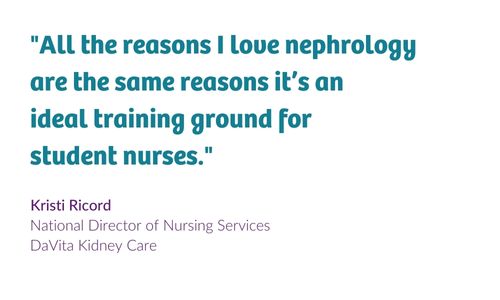
For DaVita National Director of Nursing Services, Kristi Ricord, the commitment to care extends beyond patients. Ever since she became immersed in the field decades ago, she’s felt a personal mission to nurture and elevate fellow nurses, and indeed the entire profession.
Ricord began her career in critical care, but soon became curious about nephrology while observing colleagues charged with dialyzing patients in the ICU. “Like most critical care nurses, I was a bit of a control freak,” jokes Ricord. “So I had to understand exactly what these dialysis nurses were doing with my patients, and the more I learned, the more fascinated I became.”
Before long Ricord transitioned to the nephrology specialty and began a steady upward trajectory into nursing leadership roles, pursuing a master’s degree and ultimately a doctorate, which she earned while also working full-time and raising four children during the height of COVID-19. Ricord’s ambition sprung from genuine passion for the work. “I absolutely fell in love with nephrology,” she explains. “Kidney disease is an incredibly complex condition affecting every system of the body. So, working with these patients requires a great deal of expertise and critical thinking. It’s a field where nurses can truly operate at the top of their license.”
Ricord also points out that even as nephrology nursing demands sophisticated technical expertise and problem-solving, it also provides tremendous opportunities for nurses to exercise their social and emotional talents. It’s common for dialysis nurses to form relationships with patients and their loved ones that endure for years. “It’s a genuine blessing to be part of patients’ journeys through kidney disease,” Ricord reflects.
Amid a serious national nurse shortage, Ricord and her colleagues in DaVita’s nursing leadership team are convinced that the field of nephrology has a special role to play in inspiring and training the next generation. “All the reasons I love nephrology are the same reasons it’s an ideal training ground for student nurses,” Ricord asserts. She also notes that unlike some specialties that are reliant on large urban hospital systems, dialysis happens everywhere. “When we think about involving the DaVita clinical network in student nurse training, we also see possible benefits for both patients and the medical workforce in rural communities. The vision makes sense on so many levels.”
DaVita’s goals in in furthering their support for student nurses fits neatly into the organization’s existing development programs for licensed nurses early in their careers. These include a robust preceptor program and a year-long nurse residency program which is quickly expanding and will soon cover the entire U.S. DaVita clinical network.
No stranger to big challenges, Ricord sees a bright future ahead for nurses within DaVita and beyond. “I’m thrilled to have a seat at the table with an incredible leadership team that shares my values. We’re looking at the big picture, helping solve problems and focusing on driving excellence in the field of nursing. That’s what I’ve always worked for, and it’s what I love.”









